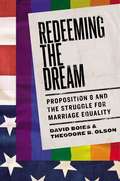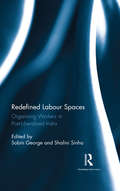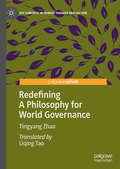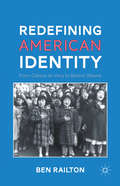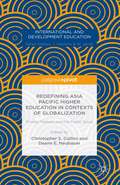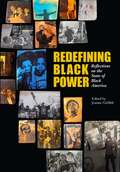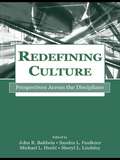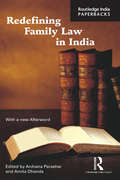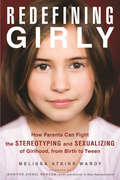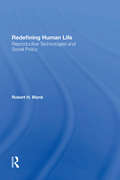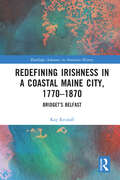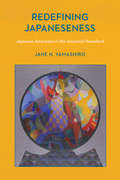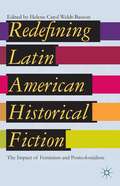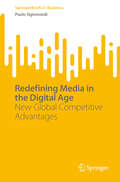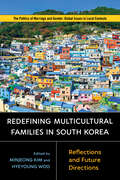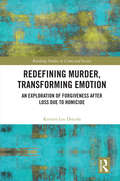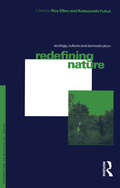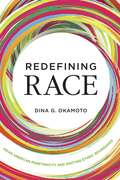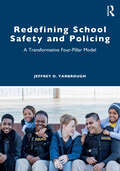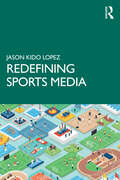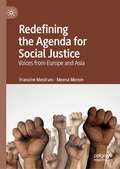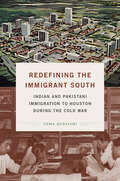- Table View
- List View
Redeeming the Dream: The Case for Marriage Equality
by Theodore B. OlsonThe riveting inside story of the Supreme Court's landmark ruling on Proposition 8--by the two lawyers who argued the case<P><P> On June 26, 2013, the Supreme Court of the United States issued a pair of landmark decisions, striking down the Defense of Marriage Act and eliminating California's discriminatory Proposition 8, reinstating the freedom to marry for gays and lesbians in California.<P> Redeeming the Dream is the story of how David Boies and Theodore B. Olson--who argued against each other all the way to the Supreme Court in Bush v. Gore--joined forces after that titanic battle to forge the unique legal argument that would carry the day. As allies and not foes, they tell the fascinating story of the five-year struggle to win the right for gays to marry, from Proposition 8's adoption by voters in 2008, to its defeat before the highest court in the land in Hollingsworth v. Perry in 2013.<P> Boies and Olson guide readers through the legal framing of the case, making crystal clear the constitutional principles of due process and equal protection in support of marriage equality while explaining, with intricacy, the basic human truths they set out to prove when the duo put state-sanctioned discrimination on trial.<P> Redeeming the Dream offers readers an authoritative, dramatic, and up-close account of the most important civil rights issue--fought and won--since Brown v. Board of Education and Loving v. Virginia.
Redeeming the Great Emancipator
by Allen C. GuelzoAbraham Lincoln projects a larger-than-life image across American history owing to his role as the Great Emancipator. Yet this noble aspect of Lincoln's identity is the dimension that some historians have cast into doubt. The award-winning historian and Lincoln scholar Allen Guelzo offers a vigorous defense of America's sixteenth president.
Redefined Labour Spaces: Organising Workers in Post-Liberalised India
by Sobin George Shalini SinhaThis book discusses the transformation of labour movements and trade unionism in post-liberalised India. It looks at emerging collectivism, both in formal and informal sectors, and relates it to changing political and industrial relations. Bringing together studies of resistance, struggles and new forms of negotiations from different industries –agriculture, fisheries, brick kiln, plantations, IT, domestic workers, shipbreakers, sex workers, and miners –this book exposes the myths, realities and challenges that the present generation of workers in India face and struggle with. With contributions from leading thinkers in the field, the work deepens the understanding of the current Indian labour spaces, possibilities for contestations and articulations from below. The volume will be useful to students and researchers of labour studies, economics, sociology, development studies and public policy. It will be an invaluable resource to those engaged with industrial relations, trade unions, human rights, social exclusion as well as labour organisations and research institutions.
Redefining A Philosophy for World Governance (Key Concepts in Chinese Thought and Culture)
by Tingyang ZhaoThis Key Concepts pivot discusses the contemporary relevance of the ancient Chinese concept of Tianxia or ‘All-Under-Heaven’ and argues the case for a new global political philosophy. ‘All-under-heaven’ is a conceptualization of the world as the composition of three realms: the physical, psychological and political, which places inclusivity and harmony at the heart of a global world view above other considerations, transcending the notion of nation state. In a highly interconnected and globalized world, the idea of Tianxia can offer a new 21st century vision of international relations and world order, based on a harmonized global organization defined by the “all-inclusiveness principle.” Promoting the ontology of co-existence and relational rationality hand in hand with rational risk aversion in a globalized world, this pivot makes the case that Tianxia could offer a new vision for contemporary world order, redefining the universality and legitimacy of politics.
Redefining American Identity: From Cabeza de Vaca to Barack Oba
by Ben RailtonUsing five personal narratives and in contrast to both the traditional and multicultural narratives, this book suggest cross-cultural transformation has been at the core of America since the first moments of contact.
Redefining Ancient Orphism
by Radcliffe G. Edmonds IIIThis book examines the fragmentary and contradictory evidence for Orpheus as the author of rites and poems to redefine Orphism as a label applied polemically to extra-ordinary religious phenomena. Replacing older models of an Orphic religion, this richer and more complex model provides insight into the boundaries of normal and abnormal Greek religion. The study traces the construction of the category of 'Orphic' from its first appearances in the Classical period, through the centuries of philosophical and religious polemics, especially in the formation of early Christianity and again in the debates over the origins of Christianity in the nineteenth and twentieth centuries. A paradigm shift in the study of Greek religion, this study provides scholars of classics, early Christianity, ancient religion and philosophy with a new model for understanding the nature of ancient Orphism, including ideas of afterlife, cosmogony, sacred scriptures, rituals of purification and initiation, and exotic mythology.
Redefining Asia Pacific Higher Education in Contexts of Globalization: Private Markets And The Public Good (International and Development Education)
by Deane E. Neubauer Christopher S. CollinsThis edited volume addresses the dynamic global contexts redefining Asia Pacific higher education, including cross-border education, capacity and national birthrate profiles, pressures created within ranking/status systems, and complex shifts in the meanings of the public good that influence public education in an increasingly privatized world.
Redefining Black Power
by Van Jones Michelle Alexander Vincent Harding Joanne GriffithThe Obama presidency represents a major milestone in black history and the struggle for political, economic and cultural equality in the United States. But how--if at all--has the first black presidency helped move things forward for people of color? Has it delivered the "change we can believe in" and "deepening of democracy" that communities of color organized around? How has the reality and image of a black First Family impacted American culture? What lessons from past struggles can be applied to this unique historical moment to advance multicultural democracy in the U.S.?Starting the exploration of these questions with the voices of past civil rights and black power activists held in the historic Pacifica Radio Archives, BBC journalist Joanne Griffith traveled the country to interview black intellectuals, leaders and activists.The result is a rich and wide-ranging exploration of the hot-button issues facing African Americans today, from religion, law amd media to education and the economy, to the ever-shifting meaning of Obama's contribution and impact. Both timely and rich in personal wisdom, Redefining Black Power connects the dots between past civil rights struggles and the future of black civic and cultural life in the United States.Featuring Van Jones, Michelle Alexander, Julianne Malveaux, Vincent Harding, Ramona Africa, Esther Armah and Linn Washington Jr.Foreword by Pacifica Radio Archives director Brian DeShazor.Praise for Joanne Griffith:"Joanne Griffith is a superb journalist! She writes, speaks, and interviews with great skill, sincerity, and sensitivity to those she covers. Joanne has made it in a tough journalism world -- one where the white males, working for wealthy news organizations, have the advantages. Her writings and insights are a lesson to all. She reflects President Obama's spirited call of 'fired up, ready to go!'"--Connie Lawn, Senior White House Correspondent (since 1968)
Redefining Culture: Perspectives Across the Disciplines (Routledge Communication Series)
by John R. Baldwin Michael L. Hecht Sandra L. Faulkner Sheryl L. LindsleyRedefining Culture: Perspectives Across the Disciplines argues that culture is one of the most important factors we need to know when we interact as well as in our discussions of social problems and their solutions. This book picks up the dialogue where Kroeber and Kluckhohn left off in their classic 1952 collection and analysis of definitions of culture. As a resource for personal and academic libraries, this volume provides an updated listing of over 300 definitions of culture from a wide array of disciplines. Chapters examine how the definition of culture has changed historically, consider themes that cut across the definitions, and provide models for organizing approaches to defining culture. To round out this multi-disciplinary perspective, Renato Rosaldo provides a foreword, and prominent authors from six disciplines write about how they conceptualize culture and use it in their research and practice. This resource is an indispensable reference for scholars studying or integrating culture into their work. It will appeal to anyone interested in culture, particularly students and scholars in anthropology, intercultural and international communication, cultural studies, cultural and social psychology, linguistics, sociology, family studies, political science, intergroup relations, cultural geography, and multicultural education.
Redefining Family Law in India
by Archana ParasharThis volume is a collection of articles by scholars across disciplines to create a discourse of family law independent of Religious Personal Law, whilst striving for fairness and justice to all. It demonstrates the artificiality of the public–private divide and seeks the systematic development of ideas for a fair and just family law in contemporary India.The book does not merely document the pathologies of power within the family but also makes proposals for remedying these inequities. It is not confined to considering what changes need to be inducted into existing family law to make it more just, but also strategises on the means and methods of effecting the change. It lifts the familial veil and scrutinises the status, rights and disabilities of some of the subordinated members of the family. The volume is an invitation to redefine family law with the twin tools of reflection and responsibility.It will interest those in law judges, legislators, law reformers as well as those in women and family studies, policy makers and policy analysts, apart from the general reader.
Redefining Girly: How Parents Can Fight the Stereotyping and Sexualizing of Girlhood, from Birth to Tween
by Melissa Wardy Jennifer Siebel NewsomContaining practical, specific parenting advice; strategies for effecting change with educators, store managers, corporations, and more; and tips for challenging and changing the media, this essential guide gives parents the tools they need to fight back against the modern stereotyping and sexualization of young girls. Activist Melissa Wardy shares tangible advice for getting young girls to start thinking critically about sexed-up toys and clothes while also talking to girls about body image issues. She provides tips for creating a home full of diverse, inspiring toys and media free of gender stereotypes, using consumer power to fight companies that make such major missteps, and taking the reins to limit, challenge, and change the harmful media and products bombarding girls. Redefining Girly provides specific parenting strategies, templates, and sample conversations and includes letters from some of the leading experts in education, psychology, child development, and girls' advocacy.
Redefining Human Life: Reproductive Technologies And Social Policy
by Robert H BlankThis book examines critical social-policy issues emerging from recent developments in human reproductive technology. Although considerable attention has been focused on the ethical dimensions of these developments, the policy dimension has largely been obscured.Dr. Blank now provides a far-ranging overview of the cumulative impact on society of a wide array of new reproductive technologies and the social patterns that accompany or precede their application.The book begins with a description of the current context of reproductive decision making. Dr. Blank demonstrates how emerging technologies are producing complex and intense social-policy concerns,then reviews in detail human reproductive technologies, and illustrates the significant consequences of technological innovations for political and legal concepts of rights and obligations. (Examples include recent cases involving torts for wrongful life.) He analyzes possible alterations in the moral and legal status of the fetus in light of apparent technological and social-policy trends and presents a paradigm of fetal rights that reflects these changes. A final case is made for a comprehensive assessment of reproductive technologies, as well as for the urgent need to refine concepts of human life that in the past have been taken for granted, but that now are being challenged.
Redefining Irishness in a Coastal Maine City, 1770–1870: Bridget’s Belfast (Routledge Advances in American History #20)
by Kay RetzlaffRedefining Irishness in a Coastal Maine City, 1770–1870: Bridget's Belfast examines how Irish immigrants shaped and reshaped their identity in a rural New England community. Forty percent of Irish immigrants to the United States settled in rural areas. Achieving success beyond large urban centers required distinctive ways of performing Irishness. Class, status, and gender were more significant than ethnicity. Close reading of diaries, newspapers, local histories, and public papers allows for nuanced understanding of immigrant lives amid stereotype and the nineteenth century evolution of a Scotch-Irish identity.
Redefining Japaneseness: Japanese Americans in the Ancestral Homeland
by Jane H. YamashiroThere is a rich body of literature on the experience of Japanese immigrants in the United States, and there are also numerous accounts of the cultural dislocation felt by American expats in Japan. But what happens when Japanese Americans, born and raised in the United States, are the ones living abroad in Japan? Redefining Japaneseness chronicles how Japanese American migrants to Japan navigate and complicate the categories of Japanese and “foreigner.” Drawing from extensive interviews and fieldwork in the Tokyo area, Jane H. Yamashiro tracks the multiple ways these migrants strategically negotiate and interpret their daily interactions. Following a diverse group of subjects—some of only Japanese ancestry and others of mixed heritage, some fluent in Japanese and others struggling with the language, some from Hawaii and others from the US continent—her study reveals wide variations in how Japanese Americans perceive both Japaneseness and Americanness. Making an important contribution to both Asian American studies and scholarship on transnational migration, Redefining Japaneseness critically interrogates the common assumption that people of Japanese ancestry identify as members of a global diaspora. Furthermore, through its close examination of subjects who migrate from one highly-industrialized nation to another, it dramatically expands our picture of the migrant experience.
Redefining Latin American Historical Fiction
by Helene Carol Weldt-BassonCurrent scholarship on Latin American historical fiction has failed to take feminism and postcolonialism into account. This study uses these important contemporary discourses as a starting point for a new definition of the Latin American historical novel that includes national identity, magical realism, historical intertextuality, and symbolism.
Redefining Media in the Digital Age: New Global Competitive Advantages (SpringerBriefs in Business)
by Paolo SigismondiThe global rise of streaming and social media platforms, and the influence of tech giants in increasingly more sectors of the economy including the media industry, have disrupted the status quo of the global media competitive landscape. This volume offers an insightful analysis of the profound changes in the competitive advantages in the media industry ushered in by digital convergence, and their ramifications. As Hollywood enters its second century, it faces novel challenges stemming from the digital revolution, which are greater, in magnitude and in impact, than any of those brought in by previous communication technology revolutions in the last century. These new challenges include the ascent of new competitors, leading conglomerates arising from the digital revolution, which as a result of the ever-expanding reach of digital convergence are successfully operating in the media sector as well. The new competitive dynamics are on display in the analysis of the streaming and social media landscapes. This book sheds light on the clash of two institutional logics within the new attention economy and its consequences on the competitive landscape. The legacy media institutional logics, represented by the legacy media conglomerates revolving around the Hollywood studios, which have established their primacy in the global mediascape for decades, now directly compete in the new landscape shaped by digital convergence with the digital media institutional logics identifying the tech giants emerging victorious from the digital revolution. The analysis utilizes the dichotomy between scripted and non-scripted media entertainment as a framework to assess the diverse competitive landscapes, business dynamics and their implications, of the different segments shaping the contours and boundaries of the media industry.
Redefining Multicultural Families in South Korea: Reflections and Future Directions (Politics of Marriage and Gender: Global Issues in Local Contexts)
by Ilju Kim Julie S Kim YoonKyung Kwak Hyun Mee Kim Yu Seon Yu Sohoon Yi Nora-Hui-Jung Kim Hsin-Chieh Chang Minjung Kim Harris Hyun-soo Kim Lindsey Wilkinson Wonjeong Jeong Sojung LimRedefining Multicultural Families in South Korea provides an in-depth look at the lives of families in Korea that include immigrants. Ten original chapters in this volume, written by scholars in multiple social science disciplines and covering different methodological approaches, aim to reinvigorate contemporary discussions about these multicultural families. Specially, the volume expands the scope of “multicultural families” by examining the diverse configurations of families with immigrants who crossed the Korean border during and after the 1990s, such as the families of undocumented migrant workers, divorced marriage immigrants, and the families of Korean women with Muslim immigrant husbands. Second, instead of looking at immigrants as newcomers, the volume takes a discursive turn, viewing them as settlers or first-generation immigrants in Korea whose post-migration lives have evolved and whose membership in Korean society has matured, by examining immigrants’ identities, need for political representation, their fights through the court system, and the aspirations of second-generation immigrants.
Redefining Murder, Transforming Emotion: An Exploration of Forgiveness after Loss Due to Homicide (Routledge Studies in Crime and Society)
by Kristen Lee DiscolaOffering insights based on years of original research, Redefining Murder, Transforming Emotion: An Exploration of Forgiveness after Loss Due to Homicide investigates the ideas and experiences of individuals who have lost loved ones to homicide (co-victims) in order to advance our understanding of the emotional transformation of forgiveness. It stands at the crux of two vibrant, growing fields: criminal victimology and the sociology of emotion. Analysis of 36 intensive interviews with co-victims and three years of participant observation of self-help groups and other victim-centered events offers a multidimensional understanding of forgiveness. Specifically, this book answers the questions of "What?," "When?," "How?," and "Why?" forgiveness occurs by exploring co-victims’ ideas about forgiveness, the differential experiences of various groups of people, the processes through which forgiveness occurs in a variety of extreme circumstances of homicide, and co-victims’ motivations toward forgiveness. The book concludes with commentary on overarching conclusions based on this work; theoretical and practical implications; suggestions for directions for future inquiry; and an in-depth account of the methodological strategies employed to gather such rich and nuanced data. This book will appeal to academics and students alike, within relevant fields, including sociology, criminology, restorative justice, victim services, psychology, and social welfare, as well as individuals seeking a better understanding of their own experiences, including co-victims or others whose lives have been altered by extreme forms of violence and upheaval. Its detailed postscript will also serve well those interested in qualitative methodology in social science research.
Redefining Nature: Ecology, Culture and Domestication (Explorations In Anthropology Ser.)
by Roy EllenHow can anthropology improve our understanding of the interrelationship between nature and culture?- What can anthropology contribute to practical debates which depend on particular definitions of nature, such as that concerning sustainable development?Humankind has evolved over several million years by living in and utilizing 'nature' and by assimilating it into 'culture'. Indeed, the technological and cultural advancement of the species has been widely acknowledged to rest upon human domination and control of nature. Yet, by the 1960s, the idea of culture in confrontation with nature was being challenged by science, philosophy and the environmental movement. Anthropology is increasingly concerned with such issues as they become more urgent for humankind as a whole. This important book reviews the current state of the concepts of 'nature' we use, both as scientific devices and ideological constructs, and is organised around three themes:- nature as a cultural construction;- the cultural management of the environment; and- relations between plants, animals and humans.
Redefining Race: Asian American Panethnicity and Shifting Ethnic Boundaries
by Dina G. OkamotoIn 2012, the Pew Research Center issued a report that named Asian Americans as the “highest-income, best-educated, and fastest-growing racial group in the United States.” Despite this seemingly optimistic conclusion, over thirty Asian American advocacy groups challenged the findings. As many pointed out, the term “Asian American” itself is complicated. It currently denotes a wide range of ethnicities, national origins, and languages, and encompasses a number of significant economic and social disparities. In Redefining Race, sociologist Dina G. Okamoto traces the complex evolution of this racial designation to show how the use of “Asian American” as a panethnic label and identity has been a deliberate social achievement negotiated by members of this group themselves, rather than an organic and inevitable process. Drawing on original research and a series of interviews, Okamoto investigates how different Asian ethnic groups in the U.S. were able to create a collective identity in the wake of the Civil Rights movement in the 1960s. Okamoto argues that a variety of broad social forces created the conditions for this developing panethnic identity. Racial segregation, for example, shaped how Asian immigrants of different national origins were distributed in similar occupations and industries. This segregation of Asians within local labor markets produced a shared experience of racial discrimination, which encouraged Asian ethnic groups to develop shared interests and identities. By constructing a panethnic label and identity, ethnic group members took part in creating their own collective histories, and in the process challenged and redefined current notions of race. The emergence of a panethnic racial identity also depended, somewhat paradoxically, on different groups organizing along distinct ethnic lines in order to gain recognition and rights from the larger society. According to Okamoto, these ethnic organizations provided the foundation necessary to build solidarity within different Asian-origin communities. Leaders and community members who created inclusive narratives and advocated policies that benefited groups beyond their own were then able to move these discrete ethnic organizations toward a panethnic model. For example, a number of ethnic-specific organizations in San Francisco expanded their services and programs to include other ethnic group members after their original constituencies dwindled. A Laotian organization included refugees from different parts of Asia, a Japanese organization began to advocate for South Asian populations, and a Chinese organization opened its doors to Filipinos and Vietnamese. As Okamoto argues, the process of building ties between ethnic communities while also recognizing ethnic diversity is the hallmark of panethnicity. Redefining Race is a groundbreaking analysis of the processes through which group boundaries are drawn and contested. In mapping the genesis of a panethnic Asian American identity, Okamoto illustrates the ways in which concepts of race continue to shape how ethnic and immigrant groups view themselves and organize for representation in the public arena.
Redefining Rape
by Estelle B. FreedmanRape has never had a universally accepted definition, and the uproar over "legitimate rape" during the 2012 U. S. elections confirms that it remains a word in flux. "Redefining Rape" tells the story of the forces that have shaped the meaning of sexual violence in the United States, through the experiences of accusers, assailants, and advocates for change. In this ambitious new history, Estelle Freedman demonstrates that our definition of rape has depended heavily on dynamics of political power and social privilege. The long-dominant view of rape in America envisioned a brutal attack on a chaste white woman by a male stranger, usually an African American. From the early nineteenth century, advocates for womens rights and racial justice challenged this narrow definition and the sexual and political power of white men that it sustained. Between the 1870s and the 1930s, at the height of racial segregation and lynching, and amid the campaign for woman suffrage, womens rights supporters and African American activists tried to expand understandings of rape in order to gain legal protection from coercive sexual relations, assaults by white men on black women, street harassment, and the sexual abuse of children. By redefining rape, they sought to redraw the very boundaries of citizenship. Freedman narrates the victories, defeats, and limitations of these and other reform efforts. The modern civil rights and feminist movements, she points out, continue to grapple with both the insights and the dilemmas of these first campaigns to redefine rape in American law and culture.
Redefining School Safety and Policing: A Transformative Four-Pillar Model
by Jeffrey D. YarbroughRedefining School Safety and Policing identifies and works to eliminate systemic issues in school policing that negatively impact students of color, LGBTQIA+ students, and other marginalized populations. Focusing on the fundamental goal of creating safe learning environments, Yarbrough lays out the unintended consequences of involving police in the administrative disciplinary process, as agents of school administrators and enforcers of zero-tolerance policies. Behavioral health support is important to students going through social, emotional, and mental health crises. True equity work brings everyone to a safe space in the middle, encouraging open discussion and courageous dialogue and aiming to create positive change. Yarbrough argues that behavioral health and racial equity are vital to transforming school policing and providing beneficial alternative solutions to school policing that do not lead students to the juvenile or criminal justice system. This book is suitable for colleges and universities, K-12 school administrators, teachers, police and school resource officers, counselors, social workers, and community activists.
Redefining Sports Media
by Jason Kido LopezThis book argues that the examination of sports media within cultural and media studies is organized around more than just a shared topic: mediated sports. What count as "sports media" in journals, books, and conferences are extremely diverse; they can cover athlete expression on social media, shoe commercials, gender in sports commentary, Indigenous name change activists, and fantasy sports. Besides being mediated and, in some cases, loosely connected to sports events and leagues, it is hard to see what they all share that could serve as the foundation for a unified field of study. Jason Kido Lopez argues that sports media are defined by genre, which is reflected in their industries, within their content, and by their audiences. Throughout the media and cultural complex, sports and sports media are built on the genre of live and real competition and, therefore, to study sports media is to study that genre. Each chapter will explore how the genre is constructed in commodification of mediated sport, representation within sports media, athlete expression, sports fandom, and gaming around sports. This book will be of interest to those studying sports media as well as media and cultural studies, but also can be used as an introductory survey of the research on sports media from a media and cultural studies perspective.
Redefining the Agenda for Social Justice: Voices from Europe and Asia
by Meena Menon Francine MestrumThe book relates three years of history of social movements from Asia and Europe who work on social justice, as a rough overview. The work for the book is mainly done on the ground, day after day, working in villages and cities, with people and their organisations, organising resistance and preparing alternatives. It is based on the fact that European and Asian concerns are identical, in spite of divergent levels of development and wealth, and that the existing international initiatives, such as the ILO’s social protection floors, or the UN’s Sustainable Development Goals are perfectly compatible with neoliberal policies.The book goes beyond and sees social commons as a strategic tool for transforming societies. It is basically a project for the sustainability of life, of humans, of societies, and of nature. The book describes the ideas at the basis of the work in different sectors. It is not about the practice of social policies but about the ideas and discourses that can in the end shape the political practices. In sum, this book, presents a new social paradigm. It concretely shows how social justice and environmental justice do go hand in hand.
Redefining the Immigrant South: Indian and Pakistani Immigration to Houston during the Cold War (New Directions in Southern Studies)
by Uzma QuraishiIn the early years of the Cold War, the United States mounted expansive public diplomacy programs in the Global South, including initiatives with the recently partitioned states of India and Pakistan. U.S. operations in these two countries became the second- and fourth-largest in the world, creating migration links that resulted in the emergence of American universities, such as the University of Houston, as immigration hubs for the highly selective, student-led South Asian migration stream starting in the 1950s. By the late twentieth century, Houston's South Asian community had become one of the most prosperous in the metropolitan area and one of the largest in the country. Mining archives and using new oral histories, Uzma Quraishi traces this pioneering community from its midcentury roots to the early twenty-first century, arguing that South Asian immigrants appealed to class conformity and endorsed the model minority myth to navigate the complexities of a shifting Sunbelt South. By examining Indian and Pakistani immigration to a major city transitioning out of Jim Crow, Quraishi reframes our understanding of twentieth-century migration, the changing character of the South, and the tangled politics of race, class, and ethnicity in the United States.
